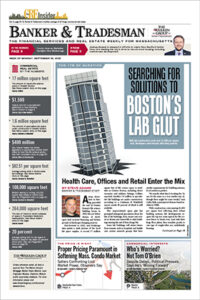Boston mayoral contender Marty Walsh is a big cheese in local labor circles, having run the powerful Boston Building Trades, which goes to bat for the ironworkers, laborers, crane operators and other union hard hats putting up all those new towers.
But the Dorchester state rep is also popular with the developers and construction bosses, tough, no-nonsense men he has surely dealt with on the other side of the negotiating table, scooping up several thousand dollars in campaign contributions in the last month alone.
This flood of cash from well-off builders underscores a key, if little-examined, facet of Boston’s pivotal mayoral race: Other than electing International Place builder Don Chiofaro or Suffolk Construction czar John Fish to the mayor’s office, it’s hard to imagine a potential future chief executive of Boston who is likely to be more aggressively pro-development than Walsh.
Friends In High Places
For a guy from Dorchester who got his start as a rank-and-file member of the Laborers Local 223, it was quite a haul.
Contributors to Walsh’s mayoral campaign have included waterfront developer Joe Fallon, who chipped in $500, as well as several thousand from executives at Corcoran Jennison Cos., a Dorchester-based apartment developer, state campaign finance records show.
Former Westwood Station developer Jay Doherty pitched in $500 as well.
George Fantini, a key player in the financing of big commercial real estate developments and sales, wrote a $500 check, while public relations maven Pamela McDermott, who has represented a who’s who of major developers, pitched in $250.
Construction executives chipped in several thousands more, including a nice $500 check from Jay Cash, and thousands more from executives at Walsh Bros., Suffolk Construction and Daniel Marr & Sons.
Why this outpouring of support from some of the industry bosses Walsh and other union leaders go head to head with on wage and benefit talks?
Despite their different negotiating positions, Boston’s trade unions and the city’s big contractors and developers are basically all on the same page.
Both want more building and construction, not less. And the mayor’s office is the key to controlling the flow of work, with outgoing Boston Mayor Thomas M. Menino having set himself up as the gatekeeper for all new development in the city.
Skeptical? Just sit in on a few board meetings of the Boston Redevelopment Authority, which gives a green light to new projects, from office towers to condo buildings and shops.
You’ll find a trade union supporter or two speaking up on behalf of the developer almost every time. And if it’s a big and hotly contested project, a whole contingent will show up, touting the big project’s benefits to the community, first and foremost being (construction) jobs.
Payback For His Base
Of course, for those who aren’t real estate insiders, this all may be a bit of fresh news.
After all, most of the media coverage of Walsh’s mayoral bid has followed a simplistic line of reasoning.
Walsh is a big labor guy with lots of campaign cash from local unions.
Therefore, he is prone to give away the shop in contract negotiations with Boston’s police, firefighters and the city’s legions of other unionized employees.
The theory is that Walsh will be forced to pay back his base.
It’s the right question, but the wrong base.
Sure, it’s legit to wonder how Walsh would deal with pressure from Boston’s always-vocal firefighters and police officers, who have given generously.
But there is a big misunderstanding here. For Walsh’s “base” is not the city’s public employee unions, but rather the trade unions that represents thousands of hard hats across the city.
And if he is going to pay back anyone, it’s going to be the hordes of hardhats who have been the foot soldiers for his campaign, as well as the union-friendly builders and developers they work for.
His roots run deep here.
The son of a union laborer, Walsh joined his dad’s union at 21 and rose through the ranks.
And until he launched his mayoral campaign, he had three jobs, a $170,000 a year post running Boston Building Trades, head of Local 223, and state representative.
So what does payback mean in this context?
Well it almost certainly means speedier approvals for big projects, which provide work for trade union members and hefty profits for the developers and builders who do business in Boston.
In fact, Walsh has already given a couple glimpses of what he might do as mayor, and he seems very much in the big project mode of Menino.
Walsh has come out for selling off City Hall to a developer, a mega project if there ever was one.
And he’s rumbled about doing away with the Boston Redevelopment Authority, a favorite whipping post for developers who complain of the long reviews and bureaucracy.
To critics, electing Walsh as mayor has to be akin to letting the fox into the henhouse. To developers and trade union members eager to get working, having Walsh in the top job would surely be a dream come true.
Either way, you can just imagine what a Mayor Walsh might do.
Scott Van Voorhis can be reached at sbvanvoorhis@hotmail.com.






